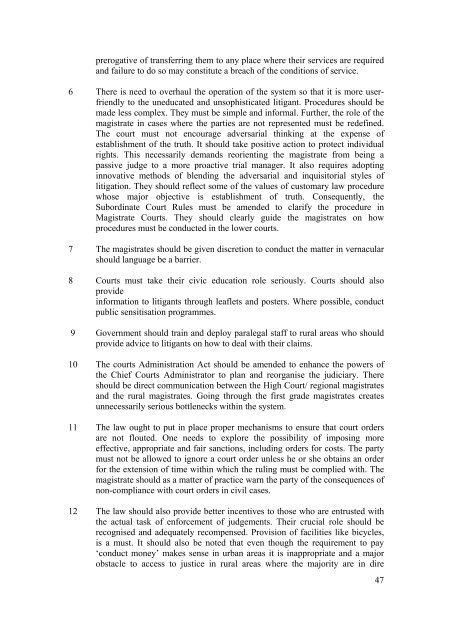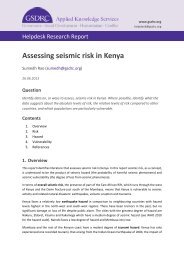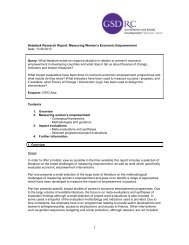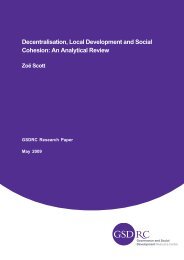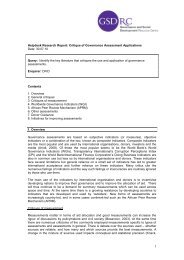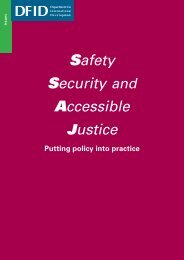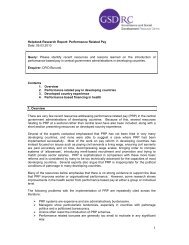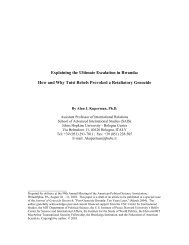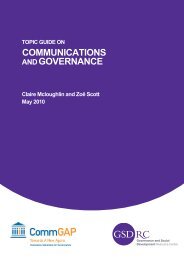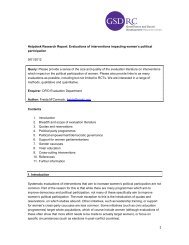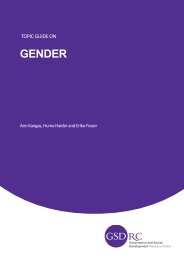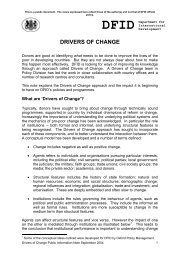ACCESS TO JUSTICE FOR THE POOR OF MALAWI? AN ... - GSDRC
ACCESS TO JUSTICE FOR THE POOR OF MALAWI? AN ... - GSDRC
ACCESS TO JUSTICE FOR THE POOR OF MALAWI? AN ... - GSDRC
- No tags were found...
Create successful ePaper yourself
Turn your PDF publications into a flip-book with our unique Google optimized e-Paper software.
prerogative of transferring them to any place where their services are requiredand failure to do so may constitute a breach of the conditions of service.6 There is need to overhaul the operation of the system so that it is more userfriendlyto the uneducated and unsophisticated litigant. Procedures should bemade less complex. They must be simple and informal. Further, the role of themagistrate in cases where the parties are not represented must be redefined.The court must not encourage adversarial thinking at the expense ofestablishment of the truth. It should take positive action to protect individualrights. This necessarily demands reorienting the magistrate from being apassive judge to a more proactive trial manager. It also requires adoptinginnovative methods of blending the adversarial and inquisitorial styles oflitigation. They should reflect some of the values of customary law procedurewhose major objective is establishment of truth. Consequently, theSubordinate Court Rules must be amended to clarify the procedure inMagistrate Courts. They should clearly guide the magistrates on howprocedures must be conducted in the lower courts.7 The magistrates should be given discretion to conduct the matter in vernacularshould language be a barrier.8 Courts must take their civic education role seriously. Courts should alsoprovideinformation to litigants through leaflets and posters. Where possible, conductpublic sensitisation programmes.9 Government should train and deploy paralegal staff to rural areas who shouldprovide advice to litigants on how to deal with their claims.10 The courts Administration Act should be amended to enhance the powers ofthe Chief Courts Administrator to plan and reorganise the judiciary. Thereshould be direct communication between the High Court/ regional magistratesand the rural magistrates. Going through the first grade magistrates createsunnecessarily serious bottlenecks within the system.11 The law ought to put in place proper mechanisms to ensure that court ordersare not flouted. One needs to explore the possibility of imposing moreeffective, appropriate and fair sanctions, including orders for costs. The partymust not be allowed to ignore a court order unless he or she obtains an orderfor the extension of time within which the ruling must be complied with. Themagistrate should as a matter of practice warn the party of the consequences ofnon-compliance with court orders in civil cases.12 The law should also provide better incentives to those who are entrusted withthe actual task of enforcement of judgements. Their crucial role should berecognised and adequately recompensed. Provision of facilities like bicycles,is a must. It should also be noted that even though the requirement to pay‘conduct money’ makes sense in urban areas it is inappropriate and a majorobstacle to access to justice in rural areas where the majority are in dire47


